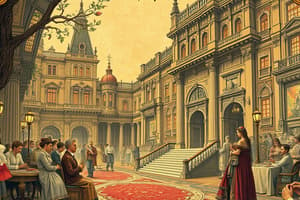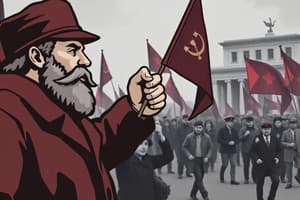Podcast
Questions and Answers
How did Karl Marx's engagement with the Young Hegelians influence his later critical approach to ideology and society?
How did Karl Marx's engagement with the Young Hegelians influence his later critical approach to ideology and society?
Marx's engagement with the Young Hegelians fostered a critical perspective towards traditional institutions and religion, shaping his later critiques of ideology and societal structures.
In what ways did Marx's collaboration with Friedrich Engels shape his understanding of capitalism and class struggle?
In what ways did Marx's collaboration with Friedrich Engels shape his understanding of capitalism and class struggle?
Engels' collaboration was crucial in helping Marx articulate his ideas about capitalism and class struggle by providing financial support, co-authoring works, and offering intellectual partnership.
How did Marx's personal experiences with censorship and political repression influence the development of his theories on power and class struggle?
How did Marx's personal experiences with censorship and political repression influence the development of his theories on power and class struggle?
His experiences with censorship and political repression likely fueled his theories by highlighting the existing power structures, encouraging him to analyze and critique them more extensively.
What are the key differences between the context and purpose of The Communist Manifesto and Das Kapital?
What are the key differences between the context and purpose of The Communist Manifesto and Das Kapital?
Discuss the lasting importance of the statement 'Workers of the world, unite!' from The Communist Manifesto.
Discuss the lasting importance of the statement 'Workers of the world, unite!' from The Communist Manifesto.
How does Marx's concept of 'commodity fetishism,' as presented in Das Kapital, challenge traditional economic views of value and exchange?
How does Marx's concept of 'commodity fetishism,' as presented in Das Kapital, challenge traditional economic views of value and exchange?
Explain how Marx's theory of surplus value relates to his critique of capitalism in Das Kapital.
Explain how Marx's theory of surplus value relates to his critique of capitalism in Das Kapital.
What is the significance of Marx's analysis of the inherent contradictions of capital accumulation in understanding economic crises?
What is the significance of Marx's analysis of the inherent contradictions of capital accumulation in understanding economic crises?
How does Marx's concept of historical materialism differ from idealistic views of history?
How does Marx's concept of historical materialism differ from idealistic views of history?
Explain the relationship between the bourgeoisie and the proletariat in Marx's theory of class struggle.
Explain the relationship between the bourgeoisie and the proletariat in Marx's theory of class struggle.
Outline the key components of Marx's labor theory of value and how it relates to the concept of surplus value.
Outline the key components of Marx's labor theory of value and how it relates to the concept of surplus value.
What is 'commodity fetishism,' and how does it distort our understanding of social and economic relationships according to Marx?
What is 'commodity fetishism,' and how does it distort our understanding of social and economic relationships according to Marx?
Describe how Marx's theory of alienation affects workers under capitalist production.
Describe how Marx's theory of alienation affects workers under capitalist production.
Briefly describe the vision for a post-capitalist society, as envisioned by Karl Marx.
Briefly describe the vision for a post-capitalist society, as envisioned by Karl Marx.
Explain the concept of dialectical materialism and its relationship to historical change.
Explain the concept of dialectical materialism and its relationship to historical change.
Discuss how Marx combined empirical analysis with philosophical analysis in his critique of political economy.
Discuss how Marx combined empirical analysis with philosophical analysis in his critique of political economy.
How did Marx's interdisciplinary approach contribute to his critique of the capitalist system?
How did Marx's interdisciplinary approach contribute to his critique of the capitalist system?
Describe how Marx’s ideas have influenced political movements around the world.
Describe how Marx’s ideas have influenced political movements around the world.
In what ways has Marx’s work influenced intellectual and academic disciplines?
In what ways has Marx’s work influenced intellectual and academic disciplines?
Explain the contemporary relevance of Marx's analysis of exploitation and alienation in modern capitalist societies.
Explain the contemporary relevance of Marx's analysis of exploitation and alienation in modern capitalist societies.
How does engagement with Marx's work challenge us to critically examine power and inequality?
How does engagement with Marx's work challenge us to critically examine power and inequality?
What role does collective human action play in Marx's vision of history and social transformation?
What role does collective human action play in Marx's vision of history and social transformation?
Explain how Marx's 'Economic and Philosophical Manuscripts of 1844' provides insight into his early thinking.
Explain how Marx's 'Economic and Philosophical Manuscripts of 1844' provides insight into his early thinking.
Flashcards
Karl Marx
Karl Marx
Revolutionary thinker who analyzed capitalism and envisioned a classless society.
Young Hegelians
Young Hegelians
Critically examined traditional institutions and religion; influenced Marx's critique of ideology.
Friedrich Engels
Friedrich Engels
Philosopher and activist who co-authored The Communist Manifesto with Marx.
The Communist Manifesto
The Communist Manifesto
Signup and view all the flashcards
Das Kapital (Capital)
Das Kapital (Capital)
Signup and view all the flashcards
Class Struggle
Class Struggle
Signup and view all the flashcards
Commodity Fetishism
Commodity Fetishism
Signup and view all the flashcards
Surplus Value
Surplus Value
Signup and view all the flashcards
Historical Materialism
Historical Materialism
Signup and view all the flashcards
Labor Theory of Value
Labor Theory of Value
Signup and view all the flashcards
Alienation
Alienation
Signup and view all the flashcards
Post-Capitalist Society
Post-Capitalist Society
Signup and view all the flashcards
Dialectical Materialism
Dialectical Materialism
Signup and view all the flashcards
Empirical Analysis
Empirical Analysis
Signup and view all the flashcards
Critique of Political Economy
Critique of Political Economy
Signup and view all the flashcards
Interdisciplinary Engagement
Interdisciplinary Engagement
Signup and view all the flashcards
Impact on Political Movements
Impact on Political Movements
Signup and view all the flashcards
Intellectual and Academic Influence
Intellectual and Academic Influence
Signup and view all the flashcards
Contemporary Relevance
Contemporary Relevance
Signup and view all the flashcards
Transformative Power
Transformative Power
Signup and view all the flashcards
Study Notes
- Karl Marx was a revolutionary thinker whose analysis of capitalism and vision for a classless society greatly impacted economics, politics, and social theory.
- His ideas, a blend of German philosophy, British political economy, and French socialism, still shape debates about power, inequality, and historical change.
Historical Context and Biography
- Born in 1818 in Trier, Prussia (modern-day Germany), into a middle-class family with Jewish heritage.
- His early education exposed him to Enlightenment rationalism and critiques of religion and authority.
- He studied law and philosophy at the universities of Bonn and Berlin.
- He became involved with the Young Hegelians in Berlin, critically examining traditional institutions and religion which influenced his critical approach toward ideology and society.
- Faced with censorship, Marx moved across Europe, spending time in Paris and Brussels and began to engage actively in revolutionary politics.
- His collaboration with Friedrich Engels was crucial in articulating his ideas about capitalism and class struggle.
- Due to his radical writings and political activities, Marx settled in London in 1849.
- He continued his research, writing, and involvement in revolutionary movements until his death in 1883.
Major Works and Literary Contributions
- Co-authored with Engels, the Communist Manifesto (1848) was a call to arms for the working class, outlining class struggle, the history of capitalism, and a vision of a society free from exploitation.
- "Workers of the world, unite!" is its famous opening line.
- Das Kapital, Marx’s magnum opus was published in three volumes, the first in 1867, with subsequent volumes compiled and published posthumously.
- It offers a critique of capitalism, focusing on the labor theory of value, surplus value, commodity fetishism, and the contradictions of capital accumulation.
- He wrote extensively in articles, essays, and letters, engaging with topics from historical materialism and political economy to the organization of revolutionary movements.
- "The Economic and Philosophical Manuscripts of 1844" provides insight into his early reflections on alienation and human freedom.
Core Philosophical and Economic Ideas
- Historical Materialism
- History is driven by material conditions rather than ideals.
- The mode of production shapes society’s political, legal, and ideological structures.
- Class Struggle
- History is a record of the struggle between classes.
- Under capitalism, the conflict is between the bourgeoisie and the proletariat.
- The struggle would lead to the overthrow of capitalism and the establishment of a classless society.
Critique of Capitalism
- Labor Theory of Value and Surplus Value
- The value of a commodity is determined by the labor invested in it.
- Workers receive less in wages than the value they create, with the surplus taken by capitalists.
- This exploitation is central to his critique.
- Commodity Fetishism
- Social relationships between people take on the form of relationships between commodities in capitalist societies.
- This obscures the exploitative nature of production.
- Alienation
- Capitalist production alienates workers from their labor, themselves, and each other.
- This undermines human creativity and potential.
- Vision for a Post-Capitalist Society
- The means of production are communally owned, eliminating the exploitation of capitalism.
- Individuals would be free to develop their full human potential.
Methodology and Philosophical Approach
- Dialectical Materialism
- Material conditions and economic realities drive historical change.
- History is a dynamic process where contradictions lead to transformative social change.
- Empirical Analysis and Critique of Political Economy
- Combined empirical investigation with philosophical analysis.
- Scrutinized economic data and social trends to challenge the dominant economic theories.
- Interdisciplinary Engagement
- Touches upon economics, history, sociology, and political theory.
- Offers a comprehensive critique of capitalism and a roadmap for revolutionary change.
Legacy and Influence
- Impact on Political Movements
- Marx’s ideas have been a catalyst for revolutionary movements.
- His critique of capitalism inspired political revolutions, most notably the Russian Revolution of 1917.
- Intellectual and Academic Influence
- Marx’s work laid the groundwork for fields such as critical theory, sociology, and political economy.
- Scholars continue to debate his ideas, applying them to contemporary issues like globalization, inequality, and labor rights.
- Contemporary Relevance
- His analysis of exploitation, alienation, and class struggle remains a vital tool for understanding modern capitalist societies.
- His ideas continue to resonate in discussions about economic justice and social transformation.
Studying That Suits You
Use AI to generate personalized quizzes and flashcards to suit your learning preferences.




